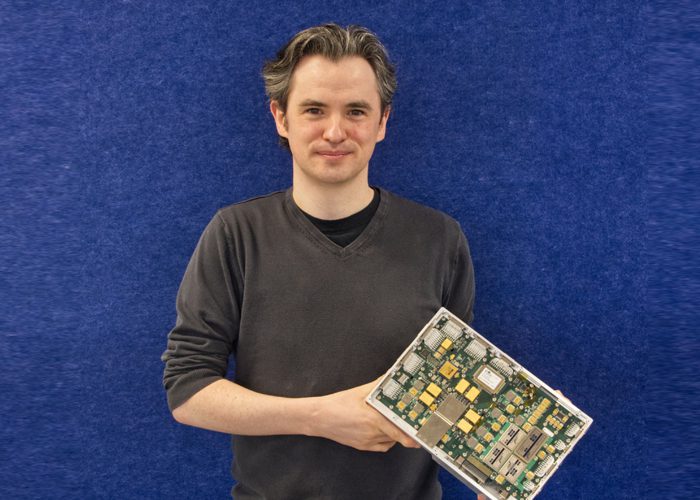AN EDINBURGH company has developed mission-critical hardware and software for new NASA technology which has now been deployed from the International Space Station [ISS].
Alpha Data, which has offices in Edinburgh, Scotland as well as Denver, Colorado is celebrating the successful activation and early data collection of the Earth Surface Mineral Dust Source Investigation [EMIT] after its installation on the space station’s exterior in July.
Developed in partnership with the NASA Jet Propulsion Laboratory [JPL], EMIT will fill a critical gap in our understanding of the Earth’s atmosphere and specifically the dust cycle.
The instrument consists of a state-of-the-art imaging spectrometer that will investigate visible and infrared light to determine the makeup of mineral dust clouds, and their role in the warming and cooling of the atmosphere.
EMIT will observe Earth from the outside of the ISS, and will deliver never-before-seen data, detailing how mineral dust clouds carried by high winds from arid regions over vast distances may heat or cool the atmosphere as they travel, with dark particles absorbing sunlight for a heating effect and light-coloured particles providing a cooling effect.
David Dolman, Senior FPGA, Electronics, and Software Design Engineer of Alpha Data who led the Alpha Data EMIT development said: “The EMIT mission will advance our knowledge and understanding of dust’s effects throughout the Earth system and to human populations now and in the future. This instrument sets a new standard in high-performance onboard processing and storage of data that is being used on the Space Station.”
Alpha Data’s Colorado-based team designed and manufactured the Focal Plane Interface Electronics – Digital [FPIE-D] which will handle a critical interface role between the spectrometer, the ISS and ground teams whilst handling a high rate of data against the backdrop of a hostile, high-radiation environment.
The software and firmware which is used to run and configure the FPIE-D through an adaptive system-on-chip Field Programmable Gate Array [SoC FPGA] was developed by the firm’s Edinburgh cohort.
The FPIE-D will digitise, store and relay the detailed images of target regions built up over the course of multiple revisits to teams on the ground and aboard the space station.
Robert Green, EMIT’s principal investigator and senior research scientist at the JPL, said: “Decades ago, when I was in graduate school, it took 10 minutes to collect a single spectrum from a geological sample in the laboratory. EMIT’s imaging spectrometer measures 300,000 spectra per second, with superior quality.
“With this exceptional performance, we are on track to comprehensively map the minerals of Earth’s arid regions – about 25% of the Earth’s land surface – in less than a year and achieve our climate science objectives.”
EMIT will gather billions of new spectroscopic measurements across six continents, closing this gap in knowledge and advancing climate science.
Kate Calvin, NASA’s Chief Scientist and Senior Climate Advisor, said: “The data we’re getting from EMIT will give us more insight into the heating and cooling of Earth, and the role mineral dust plays in that cycle. It’s promising to see the amount of data we’re getting from the mission in such a short time.”
EMITs findings will be delivered to the NASA Land Processes Distributed Active Archive Center for use by other researchers and the wider public.
David Miller, Alpha Data Managing Director, said: “The successful deployment of EMIT is a landmark achievement for Alpha Data and further strengthens our relationship with NASA’s Jet Propulsion Laboratory.
“Alpha Data’s crucial contributions to EMIT have led to a successful milestone accomplishment in this significant and accelerating industry and showcases the unrivalled ability of Alpha Data’s development frameworks to produce highly reliable, space-grade off-the-shelf electronics.”
Alpha Data and EMIT is yet another milestone within Scotland’s ever-growing space sector, which collaborates internationally on world leading research missions. EMIT follows hot on the heels of the Mid-Infrared Instrument [MIRI] – one of the four workhorse instruments onboard the NASA/ESA/CSA James Webb Space Telescope,with the UK Astronomy Technology Centre, based at the Royal Observatory in Edinburgh being the lead institution that designed and built MIRI.
Established in 1993 and with offices in the US and UK, Alpha Data is the leading global supplier of state-of-the-art solutions targeted at compute-intensive applications, including high performance Commercial Off-The-Shelf [COTS] performance computing solutions and support software. A leading provider of high-performance networking applications, Alpha Data caters to deployment in extreme environments, such as areas of high altitude.
Alpha Data has been providing modified existing products and designs to NASA from the drawing board through to deployment and beyond.
